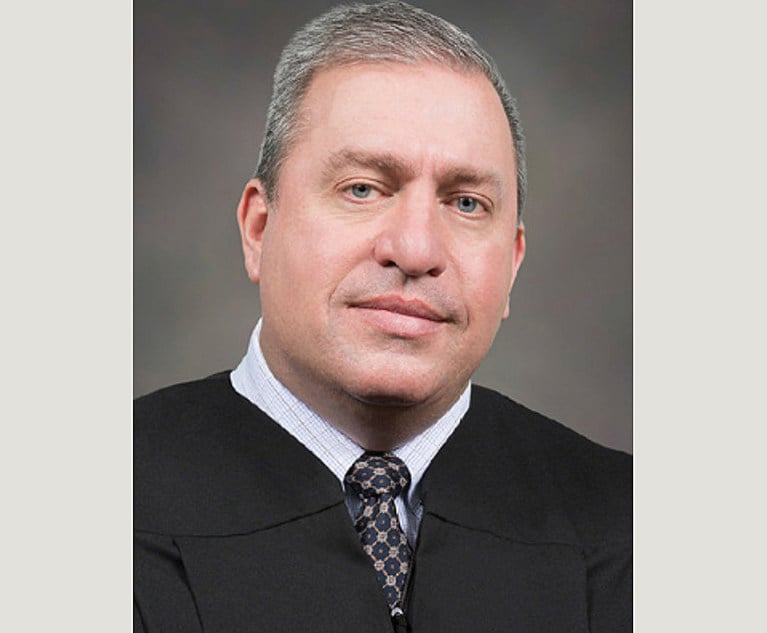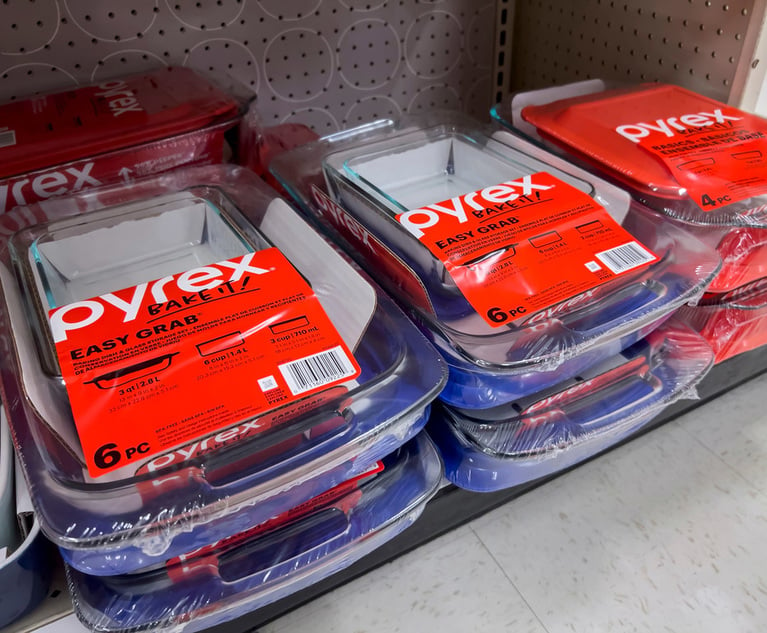Trust Not Entitled to Subrogation of Police Officer's Tort Recovery Against Motorist
"Simply, a public employer may not seek subrogation against the tort recovery of a public safety employee who is injured in a work-related automobile accident," the Commonwealth Court said.
August 07, 2019 at 04:28 PM
3 minute read

The Commonwealth Court has ruled that a self-insured workers’ compensation trust cannot subrogate an injured police officer’s recovery in a lawsuit against the motorist who injured him.
In doing so, the court reversed the ruling of the Workers’ Compensation Appeal Board, which held that the Delaware Valley Workers’ Compensation Trust was entitled to subrogation in claimant James Kenney’s third-party lawsuit against the motorist.
Kenney, a Lower Pottsgrove Township police officer, was injured in a car accident in September 2014, according to Commonwealth Court President Judge Mary Hannah Leavitt’s opinion. He was paid benefits from the Heart and Lung Act as a result. He subsequently filed suit against the driver who caused the accident.
The trust, which paid Kenney’s benefits, sought subrogation, but Kenney argued that Heart and Lung Act benefits are not subject to subrogation as workers’ compensation claims are.
Leavitt said that the Motor Vehicle Act prohibits subrogation for claims paid through the Heart and Lung Act, citing the court’s ruling in Stermel v. Workers’ Compensation Appeal Board.
“The board held that the trust paid wage and medical benefits as workers’ compensation benefits and, thus, was entitled to subrogation under Section 319 of the Workers’ Compensation Act,” Leavitt said. “The board held that the trust was entitled to recover these payments from the tortfeasor, as can any insurance carrier. Claimant argues that the board erred because the manner by which the public employer chooses to fund its liability to injured employees is irrelevant. Simply, a public employer may not seek subrogation against the tort recovery of a public safety employee who is injured in a work-related automobile accident.”
She added that in other cases, the court rejected employers’ arguments that an employer’s practice of separating the Heart and Lung benefits from workers’ compensation benefits entitled it to subrogation of the latter.
“Here, employer took pains at the WCJ hearing to establish that the trust cannot be distinguished from a commercial insurance carrier providing workers’ compensation coverage. It did so because Stermel suggested that commercial carriers, unlike self-insured employers, may be able to seek subrogation of compensation payments made to an employer. Notably, claimant agrees that the trust is, for all intents and purposes, an insurance company. The question, then, is whether that fact changes the outcome, as the board believed. We conclude that it does not,” Leavitt said.
Kenney is represented by Michael Gottlieb of Vangrossi & Recchuiti in Norristown
“We thought from the very beginning that the workers comp judge was right on the money. when we saw that the board had reversed her we were amazed,” Gottlieb said.
He added, “We went in there fighting for officer Kenney, and as it turns out there are at least six other officers that will benefit from this case.”
The township and trust is represented by Haverford-based Martin J. Fallon, who did not return a call seeking comment.
This content has been archived. It is available through our partners, LexisNexis® and Bloomberg Law.
To view this content, please continue to their sites.
Not a Lexis Subscriber?
Subscribe Now
Not a Bloomberg Law Subscriber?
Subscribe Now
NOT FOR REPRINT
© 2024 ALM Global, LLC, All Rights Reserved. Request academic re-use from www.copyright.com. All other uses, submit a request to [email protected]. For more information visit Asset & Logo Licensing.
You Might Like
View All
Pa. Federal District Courts Reach Full Complement Following Latest Confirmation

Federal Judge Hits US With $227,000 Sanction for Discovery Misconduct
3 minute read
Pa. Supreme Court Taps New Philadelphia Family Division Administrative Judge
3 minute read
Trending Stories
- 1How Uncertainty in College Athletics Compensation Could Drive Lawsuits in 2025
- 2Insurers Dodge Sherwin-Williams' Claim for $102M Lead Paint Abatement Payment, State High Court Rules
- 3Supply Chain Challenges and Opportunities Under the Second Trump Administration
- 4As Atlanta Partners Moved to Am Law 200 Firms at a Higher Rate in 2024, 2 New Arrivals Benefited
- 5A Tech-Enabled Approach to Professional Development Is the Path Forward for Young Lawyers
Who Got The Work
Michael G. Bongiorno, Andrew Scott Dulberg and Elizabeth E. Driscoll from Wilmer Cutler Pickering Hale and Dorr have stepped in to represent Symbotic Inc., an A.I.-enabled technology platform that focuses on increasing supply chain efficiency, and other defendants in a pending shareholder derivative lawsuit. The case, filed Oct. 2 in Massachusetts District Court by the Brown Law Firm on behalf of Stephen Austen, accuses certain officers and directors of misleading investors in regard to Symbotic's potential for margin growth by failing to disclose that the company was not equipped to timely deploy its systems or manage expenses through project delays. The case, assigned to U.S. District Judge Nathaniel M. Gorton, is 1:24-cv-12522, Austen v. Cohen et al.
Who Got The Work
Edmund Polubinski and Marie Killmond of Davis Polk & Wardwell have entered appearances for data platform software development company MongoDB and other defendants in a pending shareholder derivative lawsuit. The action, filed Oct. 7 in New York Southern District Court by the Brown Law Firm, accuses the company's directors and/or officers of falsely expressing confidence in the company’s restructuring of its sales incentive plan and downplaying the severity of decreases in its upfront commitments. The case is 1:24-cv-07594, Roy v. Ittycheria et al.
Who Got The Work
Amy O. Bruchs and Kurt F. Ellison of Michael Best & Friedrich have entered appearances for Epic Systems Corp. in a pending employment discrimination lawsuit. The suit was filed Sept. 7 in Wisconsin Western District Court by Levine Eisberner LLC and Siri & Glimstad on behalf of a project manager who claims that he was wrongfully terminated after applying for a religious exemption to the defendant's COVID-19 vaccine mandate. The case, assigned to U.S. Magistrate Judge Anita Marie Boor, is 3:24-cv-00630, Secker, Nathan v. Epic Systems Corporation.
Who Got The Work
David X. Sullivan, Thomas J. Finn and Gregory A. Hall from McCarter & English have entered appearances for Sunrun Installation Services in a pending civil rights lawsuit. The complaint was filed Sept. 4 in Connecticut District Court by attorney Robert M. Berke on behalf of former employee George Edward Steins, who was arrested and charged with employing an unregistered home improvement salesperson. The complaint alleges that had Sunrun informed the Connecticut Department of Consumer Protection that the plaintiff's employment had ended in 2017 and that he no longer held Sunrun's home improvement contractor license, he would not have been hit with charges, which were dismissed in May 2024. The case, assigned to U.S. District Judge Jeffrey A. Meyer, is 3:24-cv-01423, Steins v. Sunrun, Inc. et al.
Who Got The Work
Greenberg Traurig shareholder Joshua L. Raskin has entered an appearance for boohoo.com UK Ltd. in a pending patent infringement lawsuit. The suit, filed Sept. 3 in Texas Eastern District Court by Rozier Hardt McDonough on behalf of Alto Dynamics, asserts five patents related to an online shopping platform. The case, assigned to U.S. District Judge Rodney Gilstrap, is 2:24-cv-00719, Alto Dynamics, LLC v. boohoo.com UK Limited.
Featured Firms
Law Offices of Gary Martin Hays & Associates, P.C.
(470) 294-1674
Law Offices of Mark E. Salomone
(857) 444-6468
Smith & Hassler
(713) 739-1250





